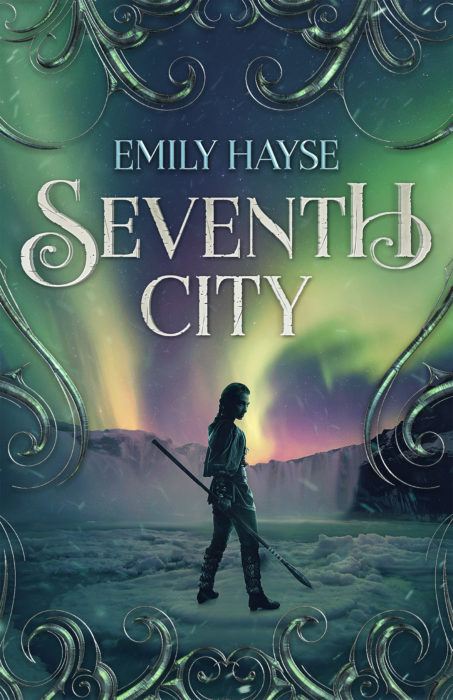Featured Review: Seventh City
Cold weather can bring wintry mixes of ice and freezing rain, which in turn can give us mixed feelings. Songs may romanticize falling snow and crackling fires, while kids long for days home from school. Then reality stings our skin with frostbite and makes grown-ups fear icy injuries and frozen pipes. Is winter, then, good or bad? It’s both and neither. Winter is just a season, offering equal parts peril and cheer.
So it is with Seventh City, the wintry-mixed and morally challenging fantasy from Emily Hayse. Set in a land north of this fantasy world’s Arctic circle, this tale starts simply: a young mother tells her daughter, Maki, about the fabled city, Inik Katsuk.
This is “the place where the heroes dwell,” the mother recalls. “It was closed to all but those who proved themselves worthy. . . . And the good live there.”
A day later, Maki and her older brother, Tsanu, can’t find her. Their mother has abandoned them. From there, Seventh City fulfills its silent pledge to explore a land of incredible physical and moral terrain. Chilled weather threatens your life, yet also blesses you with epic snowscapes, campfire camaraderie, and glimpses of the aurora borealis. Meanwhile, even heroes must tread on ground frozen by bitter grief: When Tsanu is kidnapped by a foreign military captain determined to find the lost city, Maki must rescue him by infiltrating the camp of these hated Invaders.
It’s in this territory, often unmapped by Christian readers, that Seventh City truly inspires. Yes, these Invaders are only irredeemable. Or are they? Yes, Maki’s people, the land’s natives, are only oppressed victims. Or are they? Readers tempted to favor simplistic approaches to the obvious bad guys—even invaders!—may grow by imagining themselves in a land that leaves one no easy choices to survive or do the most good. As one Invader (boldly named Ransom) phrases it, “There are many ways to react to the wrong we see in the world, Maki. Some run away from it, have nothing to do with it. Others ignore it—I cannot speak for them. It is the coward’s way. And still others brave it to its face and try, in their way, to make it better.”
Like a skilled dogsled driver, Hayse navigates such perilous turns and keeps all jostling characters and subplots on their course. It’s a beauty to behold, especially when realization dawns about these deeper cultural and moral themes.
Lest one expect any literary slush, it’s all been pre-cleared for smooth sledding. Sure, we’ve read those brave-girl-dresses-up-as-boy stories and seen other lost-city stories, but City treats these as relatively minor elements. Even one great leap, the concept that an ambitious and abusive Invader captain would trust one strange young man’s word about an ancient city, makes more sense by the story’s end.
Hayse portrays this land so realistically, even with detailed handling of horse-care and snowshoe-crafting, that one half-expects to hear mentions of the Klondike Gold Rush. Seventh City feels like a lost history from our own world. It is only separated from reality by imaginative touches like a mythical city and giant creatures.
Bundle up for Seventh City’s fantastical journey, and don’t mind the wintry skies. Only from such gray areas can we experience the lessons and wonders of winter.
Best for: Young-adult readers and older.
Discern: Trauma after parent’s abandonment, vengeful thoughts, and battles with images of animal and human injuries as well as authority figure acting abusively in sacrifice to his selfish ambition, provoking different responses from others.
More from Lorehaven’s fall 2020 cover story





































